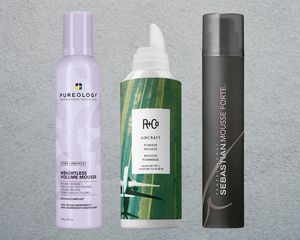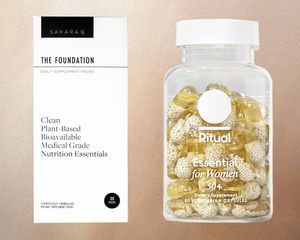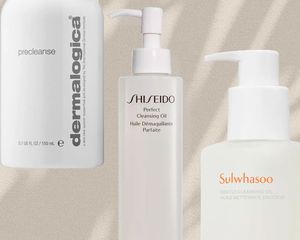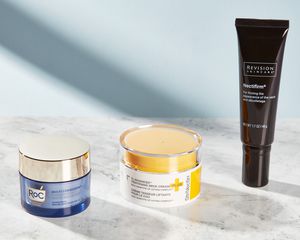:max_bytes(150000):strip_icc()/xanthangumskin-479f241db9fb435089d4ae26724354cc.jpg)
Liz DeSousa for Byrdie
The list of ingredients that you might find in both the food you're eating and the skincare you're using isn't necessarily that long. Things like coconut, olive oils, and certain herbs can be found in both the kitchen and bathroom. But there's another prevalent ingredient that intersects both the food and skincare arenas that you may not be aware of. We're talking about xanthan gum. While you may have seen it listed on the ingredient label of your go-to almond milk, you might be surprised to know that it's probably found in your favorite moisturizer, too. Ahead, New York City board-certified dermatologist Hadley King and cosmetic chemist and creator of StimuNail Stacey Steinmentz explain why that is and what you need to know.
Meet the Expert
- Hadley King is a New York City board-certified dermatologist.
- Stacey Steinmentz is a cosmetic chemist and creator of StimuNail.
Xanthan Gum
Type of ingredient: Thickener and emulsifying agent
Main benefits: While it's mainly used for formulation purposes, xanthan gum might have some skin conditioning properties because it is a polysaccharide, or sugar molecule.
Who should use it: According to our experts, it's not necessarily an ingredient anyone needs to seek out nor avoid necessarily. Mostly, it's formulators who are using it, not consumers.
Works well with: It works well with almost all ingredients.
Don't use with: There are no ingredients known to interact with xanthan gum negatively.
What Is Xanthan Gum?
"Xanthan gum is a common is a common food and skincare ingredient, most often used as a thickener or to bind other ingredients together," explains Steinmetz. "It’s formed when sugars are fermented with a bacteria known as Xanthomonas campestris to create a goo-like substance," she adds. In food, that goo-like substance helps thicken things such a salad dressing, nut milks, and sauces. In skincare, "it creates a beautiful slip and silky feel on the skin, aids with the ease of application of the product, and keeps the formula from separating," she says.
Benefits of Xanthan Gum for Skin
To be clear here, xanthan gum is very common in many skincare formulations, but that's not because it's working some wonders for your skin. It's pretty much entirely because the ingredient is an emulsifying agent that can create a smooth and evenly-texture product, explains King. To that point, it definitely benefits the texture of the product more so than your skin, she adds, noting that most cosmetic formulas only contain a tiny amount of xanthan gum, usually between .0001-2%. "It's only required in minimal qualities to get the desired texture," she says.
As an added benefit for formulators, xanthan gum is one of the only naturally-derived thickeners commonly used in skincare. "It's deemed to be very safe and is even allowed to be included in products that are considered 'natural' because of where it comes from," she says. (Xanthan gum can be derived from corn, wheat, soy, and dairy.) Also on its list of pros is the fact that its uses are truly endless. "Xanthan gum doesn't require heating or cooling to be effective and can just as easily be added to a skincare or food recipe as a common pantry ingredient such as corn starch," points out Steinmetz.
At the end of the day, "there hasn't been much research into the benefits xanthan gum has on the skin. Most of the research has been done surrounding the benefits—and concerns—associated with it as it pertains to the ingesting it in the foods we eat," says Steinmetz. Still, it might have some skin conditioning properties. The polysaccharides (AKA sugars) in xanthan gum do have the ability to lock in water to help maintain skin hydration levels, she says. Though again, xanthan gum is by no means an active ingredient you need to start searching for the next time you're shopping for skincare.
Side Effects of Xanthan Gum
Given all of the above, it should come as no surprise that most side effects are seen when xanthan gum is eaten. Ingesting large quantities can sometimes have a laxative effect and cause digestive issues, notes Steinmetz. Because it often comes from corn, wheat, soy, or dairy, people with allergies might react to it, either if ingested or used topically, notes King. So while the ingredient in and of itself is fairly inert and well-tolerated as it pertains to skincare—i.e., it won't irritate—someone might have an actual allergy to it, King says.
How to Use It
Erm, so that's the thing—there's really no wrong way to use it. And, at the risk of sounding like a broken record, xanthan gum truly isn't a skincare ingredient you need to think that much about. Its texture-enhancing abilities mean it's found in many different products, from creams to masks to cleansers, even among the clean and natural beauty space. (Heck, you can even buy xanthan gum and the Internet and use it to make a DIY pore strip.) And that's about all there is to it.



